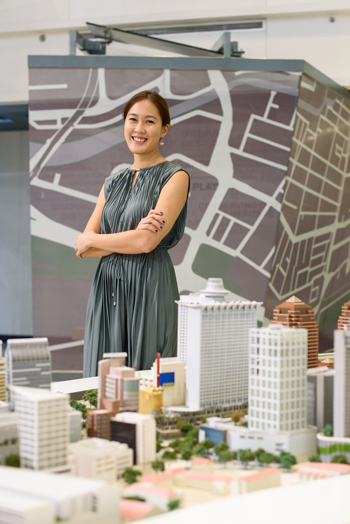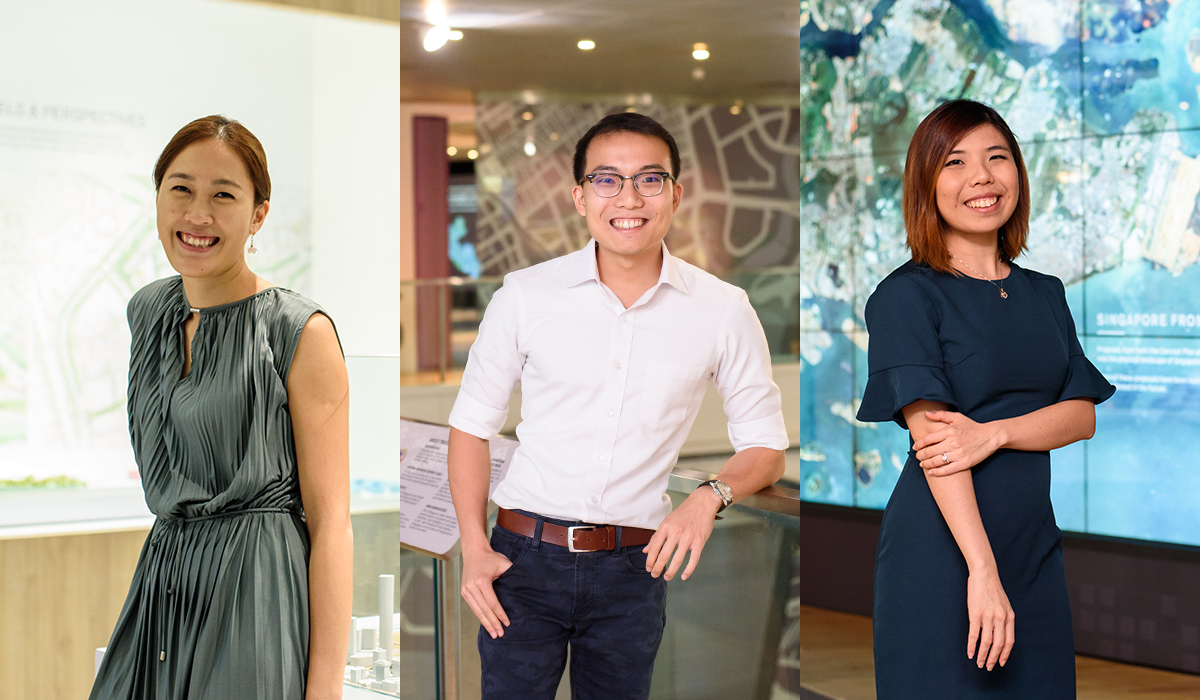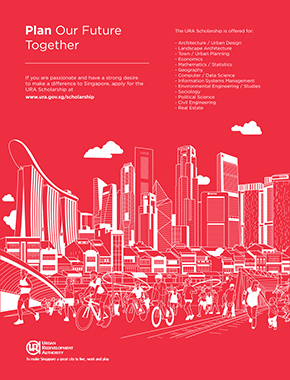Melding Art and Science
Beautiful buildings and meaningful places - Lisa Chan, an architect with the Urban Design Central Area North at the Urban Redevelopment Authority (URA) is in the thick of it all.
Since childhood, Lisa has always been captivated by architecture and how it intertwines art and science to create aesthetically pleasing spaces as well as buildings.

Lisa Chan is an architect at URA. She is a URA Scholar and holds a Bachelor in Architecture from Syracuse University and a MPhil in Architecture and Urban Studies from Cambridge University.
“Architecture is physical; it involves practical day-to-day life and art. It has the potential to transform and create spaces that are breathtaking and expressive. Architecture can affect one’s emotions and perceptions through elements like space, light, material choices and geometry,” says Lisa.
Lisa discovered URA and the scholarship programmes offered when she was in Junior College, and she decided to join the organisation for its macro perspective.
“I chose URA because it has a larger overview - namely the mission to make Singapore a great city to live, work and play. Beyond the aspect of now, I get to turn plans and visions into reality for future needs,” explains Lisa.
She furthered her studies at Syracuse University (Bachelor in Architecture) and Cambridge University (MPhil in Architecture & Urban Studies). Lisa was able to go on study abroad programmes as well, where she spent semesters in London and Florence to understand their history and how they were planned - all of which gave Lisa an added advantage in her role at URA.
Although, Lisa goes beyond just architecture at URA.
“My job scope involves the planning of physical spaces in Singapore as well as its execution through the Master Plan, a land use plan that guides Singapore’s development in the medium term. It is imperative that as planners, we have an eye on both longer-term needs, as well as present-day urban developments,” describes Lisa.
“As an architect, form and aesthetics are important considerations. But, the wide range of work in URA that I have the opportunity to experience, gives me new considerations that go into the makeup of our city.”
Lisa finds her role in URA incredibly meaningful and enjoyable, and she encourages aspiring scholars to join her if their vision aligns with the organisation.
“For anyone looking to take up a scholarship in URA, my advice is to intern here first. Even though you may not be as involved in the planning works, it will give you a good idea of what the work scope is like and if you are interested. Talking to people who are working here is also a good option. If your passions and interests are aligned with URA, that would be most ideal!”

Left: Tan Wei Ting was a Property Market
Analyst at URA. She is currently on a two-year
secondment in the Strategic Planning Division
of the Ministry of National Development. She
is a recipient of the URA Scholarship and holds
a Bachelor of Science in Economics from
University College London and a Master of Arts
in Economics from Yale University.
Right: Tan Wei Lun is a planner at URA. He is a
URA Scholar, and he holds a Bachelor of Science
in Economics from University College London
and a Master of Quantitative Methods in the
Social Sciences from Columbia University.
Working towards the same goal
Siblings Tan Wei Ting and Tan Wei Lun have similar interests in economics - both graduated with a Bachelor of Science in Economics at University College London. Even though they have chosen identical majors, URA has provided them with options to specialise in fields of their choice.
“We were allowed to pursue a wide variety of degrees as long as they were related to the built environment. URA gave us the career versatility, which enabled us to take different paths that followed our interests and specialisations - while still working toward the same goal,” says Wei Ting.
However, while they may be working in the same organisation, they play different roles.
Wei Ting was a Property Market Analyst in the Property Research Department, and her younger brother Wei Lun, is a Planner in the Physical Planning Group. Wei Ting is currently on a two-year secondment in the Strategic Planning Division of the Ministry of National Development.
“My job involves formulating land use plans to guide the physical development of Singapore in a sustainable manner. Ultimately, we aim to translate these plans into tangible developments to achieve a quality living environment for Singapore,” explains Wei Lun.
“Unlike my brother’s, my job in URA focuses on dealing with the property market and land policy issues, which involves close monitoring of trends in the market and regular reviews of policies to maintain a stable and sustainable property market. In my current role in MND, I also oversee medium-term land use plans through the Master Plan for a local planning region, such as ensuring close coordination between agencies and the timely development of local precincts and developments,” says Wei Ting.
The duo discovers that sharing their perspectives of their work has given them a better understanding of their respective roles and provided them deeper insight on how the various job scopes in URA complement one another to achieve a common goal.
Working at URA for five years and one year respectively, Wei Ting and Wei Lun find their work meaningful and enriching and believe that they can continue to contribute and learn in its nurturing and encouraging environment.
They also found their work gratifying; knowing that the work they do has a direct impact on the nation’s landscape encourages them to put their best foot forward.
“Our advice (to aspiring URA scholarship applicants) is that the scholarship is not just a means to pursue your degree. It leads to a career in the organisation. You need a clear understanding that your interests and discipline is well-suited to the organisation, and that you can foresee yourself contributing in the long run,” says Wei Ting.
“Don’t expect your major to be directly applicable to your work because most of the time, it’s not the case. Take it upon yourself to figure out how you can contribute to your job and how to apply what you have learnt in your degree to your work,” Wei Lun concludes.


